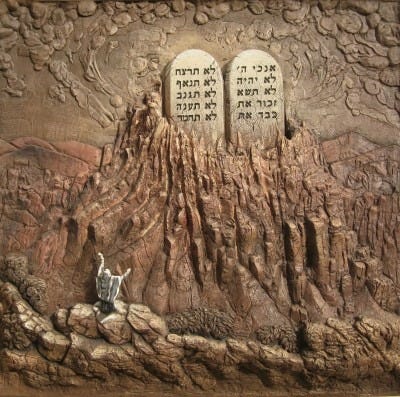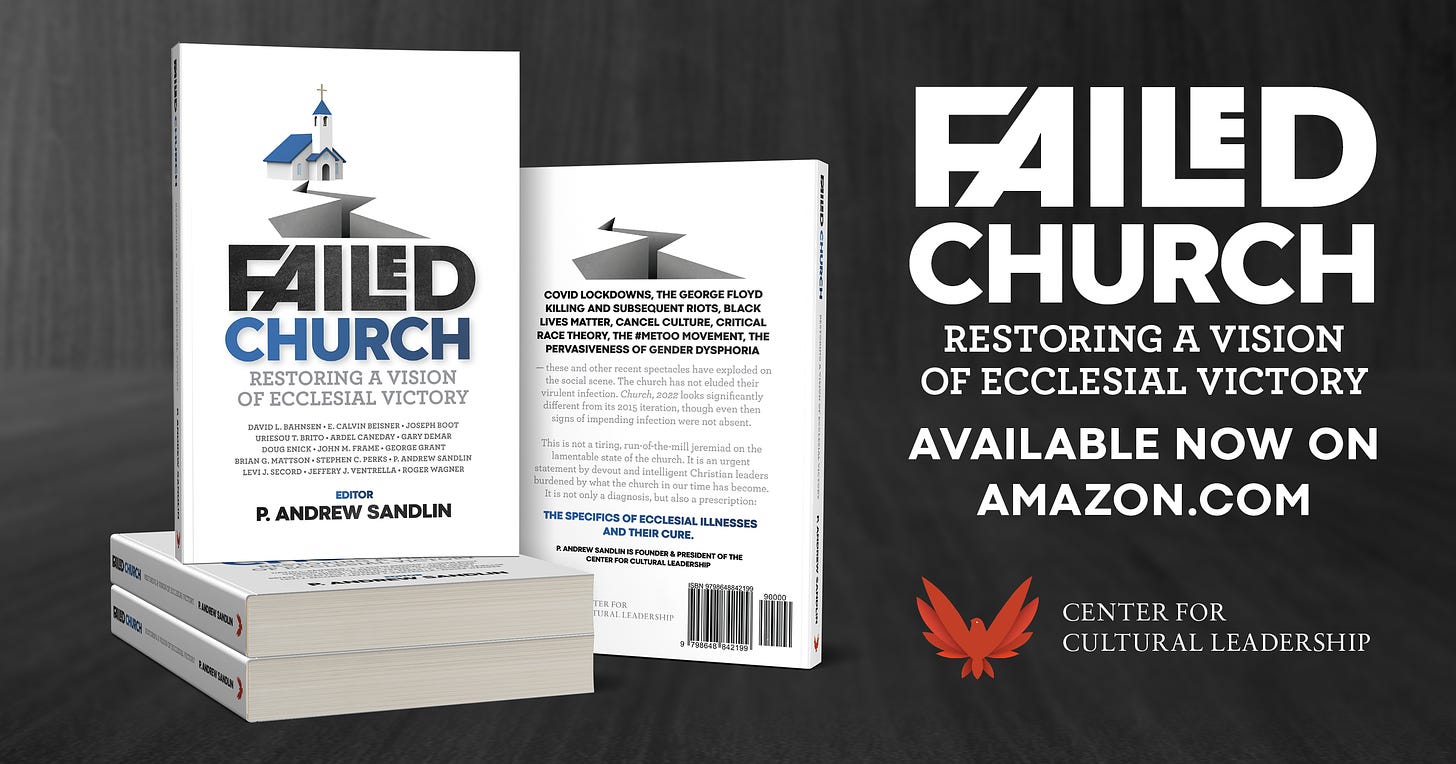Dear friends and supporters:
Due to a reaction to some new medicine I’m taking, I unfortunately had to cancel my lecture on biblical law yesterday at the Worldview Youth Academy in Ontario, Canada. Here I’d like to elaborate on a brief point I had planned to make.
The Myth of Old and New Testaments
Both the most basic and controversial aspect in interpreting the Bible during church history has been the relationship between the Old Testament (OT) and New Testament (NT). Unfortunately, that very language prejudices the issue. OT and NT isn’t biblical language nor are they biblical categories.1 They’re a theological imposition on the text (see “The Authority of the Old Testament”). The reason for the imposition seems clear: the Hebrew text deals largely with the Jews, the old (Mosaic) covenant people of God, while the subsequent Greek text deals more (though by no means exclusively) with the new covenant people of God, the multinational, multiethnic church of Jesus Christ.
But this easy classification is simplistic and superficial. For one thing, although the new covenant is ratified only in the Greek Scriptures, its line runs through the Hebrew Scriptures. For example, Jesus is the high priest after the Melchizedekian order, suited to the new covenant (Hebrews 7), and anchored firmly early in the Hebrew Scriptures, occurring historically long before the old, Mosaic covenant. Likewise, creation all the way until Israel’s formalization as a nation (Exodus 19) precedes the old covenant. Indeed, a significant portion of the Hebrew Scriptures has nothing to do with the old covenant, despite the fact that it appears in what is later termed “the law.”
For this reason and others, rather than speaking of the OT and NT, it might be preferable to refer to the Hebrew Scriptures (with a smattering of Aramaic) and the Greek Scriptures.
Or, quite simply, the single word of God, whether Hebrew, Aramaic, or Greek.
The Old Law in the New Covenant
Because the old covenant contains the Mosaic law, and because that covenant has been rescinded, many Christians suppose the Mosaic law as an entire category has been set aside. This assumption is so obviously mistaken it’s difficult to understand how anyone could’ve believed it. The fact that the Mosaic covenant has been superseded by the new covenant doesn’t mean that the Mosaic law has been superseded by some other ethical standard. Jesus confirms the authority of the Mosaic law (Matthew 5:17–18). Paul declares that it is holy, righteous, and good (Romans 7:12). He claims that the Holy Spirit is given to help new covenant believers fulfill the law (Romans 8:1–4). Sin is defined as the violation of the law (1 John 3:4). If the Mosaic law has been summarily dismissed, somebody forgot to tell the “New Testament” writers.
Indeed, one provision of the new covenant is that the law of God (that’s referring to the Mosaic law) is now written on the hearts of new covenant believers (Hebrews 8:6–13). The old covenant is set aside; the old law isn’t.
Only the Lawgiver Can Change His Law
It’s precisely at this point that hermeneutics is important. (Hermeneutics refers to the rules governing the interpretation of documents). A genuinely biblical hermeneutic demands that the default assumption on the relation between the Hebrew and Greek Scriptures is canonical continuity. “Canon” means rule, and it refers theologically to the entire Scriptures.
Unless God himself replaces or rescinds his words, they remain in force. Unless the Greek Scriptures revise some teaching or requirement of the Hebrew Scriptures, the latter are authoritative in the new covenant era.
All of the Bible binds all of God’s people (and everybody else) all the time unless God says otherwise. The Lawgiver – and nobody else — can change the law.
Now we know that whatever the law says it speaks to those who are under the law, so that every mouth may be stopped, and the whole world may be held accountable to God. (Romans 3:19)
What the Lawgiver Changed
And the Lawgiver has changed some of his law. For example, the elaborate sacrificial system of the old covenant has been fulfilled in Jesus Christ. This is a big theme of the book of Hebrews. In the language of Walter C. Kaiser, Jr., the old covenant had a “built-in expiration date.“ The Mosaic covenant was never meant to be permanent. Why? First, because it was given to Israel as a nation and only to individual Gentiles that joined it, and God’s ultimate plan was to include members of all nations and races among his covenant people if they trusted the covenant seed, Jesus Christ (Galatians 3). The old covenant was made with Israel. The new covenant is made with the new Israel, the multinational, multiethnic church of Jesus Christ.
Second, the sacrificial system, the atoning blood-shedding of bulls and goats, was a temporary reprieve pointing toward the final and enduring sacrifice of Jesus Christ. The new covenant is erected on the better promise of Jesus Christ, the Lamb slain from the world’s foundation.
In addition, that category of laws that symbolically separated ethnic Jews from Gentiles has been set aside. Since the cross of Christ tore down the wall separating Jew from Gentile (Ephesians 2), the laws supporting that wall have been torn down. This includes the dietary laws (see Brian Mattson’s “The Magnificent Pig”):
… as well as laws forbidding mixing clothing fabrics, mixing seeds while plowing a field, and so on. This also includes the Jewish feasts and festivals like the Passover that no longer need to be observed (Romans 14:5–6; Colossians 2:16–17).
A final category of laws set aside is that obviously limited to the Jews’ unique historical situation — the laws of extermination against the pagan nations in Canaan, for example. Those nations no longer exist, and military laws about their massacre are today obviously obsolete.
What the Lawgiver Hasn’t Changed
But the substance of what is sometimes been called the moral of God (though, of course, in its broader sense, all of God’s law is moral), has never been set aside. Jesus, for example, confirms the Ten Commandments (Mark 10:17–19). Paul selects a seemingly insignificant commandment in the Mosaic law to support the truth that Christian ministers should be remunerated (1 Timothy 5:17–18). The law, including its details, has not been set aside.
In fact, it is perfectly legitimate refer to our faith as “Torahic Christianity.” This resolves the apparent conflict between our Lord’s confirmation of the Mosaic law, “jot and tittle” (Matthew 5:17–18), with the Father’s declaration that his Son is superior to Moses (Matthew 17). Jesus himself was the hypostatization of Torah. Our Lord was the living, breathing, walking law of God.
Conclusion
This doesn’t answer questions about many specific applications of God’s law today, particularly the most controversial one — what about politics? — and the Mosaic law is surely political. That’s an article I’ll have to write later.
But suffice it to say now that canonical continuity is an operative hermeneutical principle, and biblical law hasn’t been thrown into the garbage dump during the new covenant era. You can dismiss biblical law, but you can’t evade it.
Yours for a unified Bible,
Founder & President, Center for Cultural Leadership
Will you consider a tax-deductible donation to CCL via PayPal or Venmo? Or mail a check to CCL, Box 100, Coulterville, CA 95311. God uses you to keep us going — and expanding.
At long last, Failed Church is available. Order softcover and digital copies here. (Contact me for quantity pricing.)
Please promote the book to church leaders and family and friends.
What is the book about?
Covid lockdowns, the George Floyd killing and subsequent riots, Black Lives Matter, cancel culture, Critical Race Theory, the #MeToo Movement, the pervasiveness of gender dysphoria — these and other recent spectacles have exploded onto the social scene. They have been such an unremitting part of our social environment over the past 2 to 5 years that they have insinuated themselves into our social currency, and it is difficult to objectively assess the state of recent culture while ignoring them.
The church has not eluded their impact. In some cases — the lockdown orders for all “nonessential” services comes to mind first — they have drastically shaped the very life of the church. Black Lives Matter, Critical Race Theory, and the #MeToo Movement have almost equally stamped themselves on a wide swath of Western Christianity, including conservative Christianity.
Church 2022 looks significantly different from its 2015 iteration, though even then signs of impending infection were not absent.
This essay collection aims to assess the present state of the church from numerous perspectives. The writers (theologians, pastors, educators, scholars, thoughtful laymen) reflect a degree of theological diversity one might expect. All of them, however, are committed to biblical authority and historic Christian orthodoxy, including, specifically, historic Protestantism.
Creational Worldview: Foundation of Thinking Christianly
To think correctly as a Christian you must first think correctly about creation.
Listen here.
More great stuff:
The Center for Cultural Leadership site is here.
My Amazon author page (print and digital) is here.
You can find my sermons and lectures at my YouTube channel.
Sign up to get my blog updates here.
Here’s my Twitter feed.
If you want to get the free exclusive hard copy publication Christian Culture, please send me a Facebook private message.
The CCL phone number is 831-420-7230.
The mailing address is:
Center for Cultural Leadership
P. O. Box 100
Coulterville, CA 95311
In the King James Version “old testament” appears in 2 Corinthians 3:14, but “testament” is the same word elsewhere translated “covenant.”








Crucial to understanding what law is no longer in effect and what law is in effect under the New Covenant is correctly identifying the added law of Galatians 3:17 & 19 - that is, the Mosaic *Covenant* and all laws unique to that Covenant.
Thus, the law that existed prior to Mt. Sinai is one and the same as the law still in effect under the New Covenant.
Because Yahweh's morality doesn't change, neither does His triune and integral moral law (the Ten Commandments and their respective statutes and civil judgments) reflecting His morality. It's this law that has always been in existence and will always be in existence.
In other words, the Ten Commandments and their respective statutes and judgments did *not* come into existence at Mt. Sinai and thus were not eliminated under the New Covenant. There is a plethora of scriptural evidence revealing the Bible's triune law's prior existence to Mt. Sinai's added *Covenant.* For example:
"Abraham obeyed my voice, and kept my charge, my commandments, my statutes, and my laws." (Genesis 26:5)
For more, see free online book "Law & Kingdom: Their Relevance Under the New Covenant" at https://www.bibleversusconstitution.org/law-kingdomFrame.html
See also Parts 12 & 13 of my expository series on Galatians at https://www.bibleversusconstitution.org/tapelist.html#T1238
It is sad that you do not understand the word "gentile". It simply means "nations". Paul was preaching to the cast-off House of Israel who had scattered far and wide after the Assyrian capture and to whom the promise that they would be redeemed, meaning to be bought back, was made. Other ethnicities had no reason to be "bought back" as they had not been cast-off. As throughout the Word, God was speaking to his "peculiar treasure" Israel (both houses). Just as in the old covenant days, peoples of different ethnicities could, and did, join themselves to Israel. So it is true today.